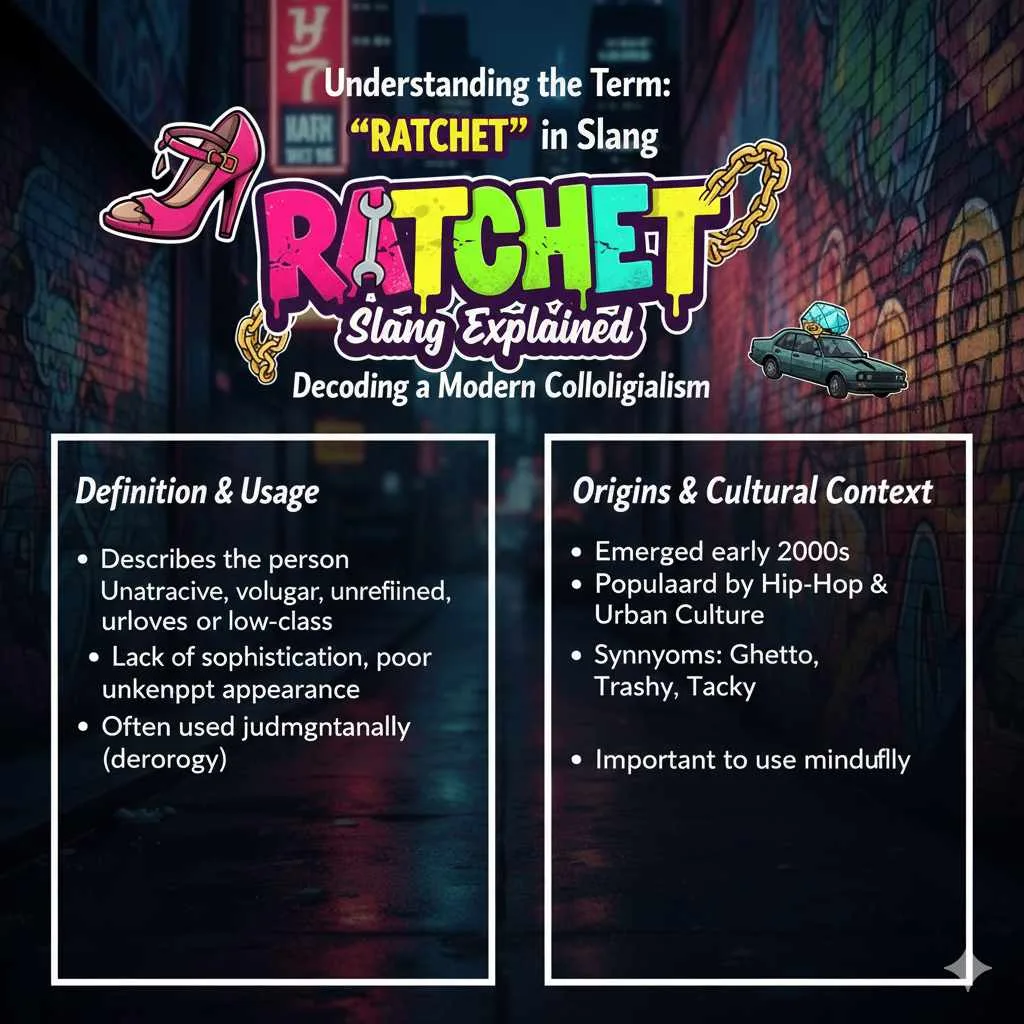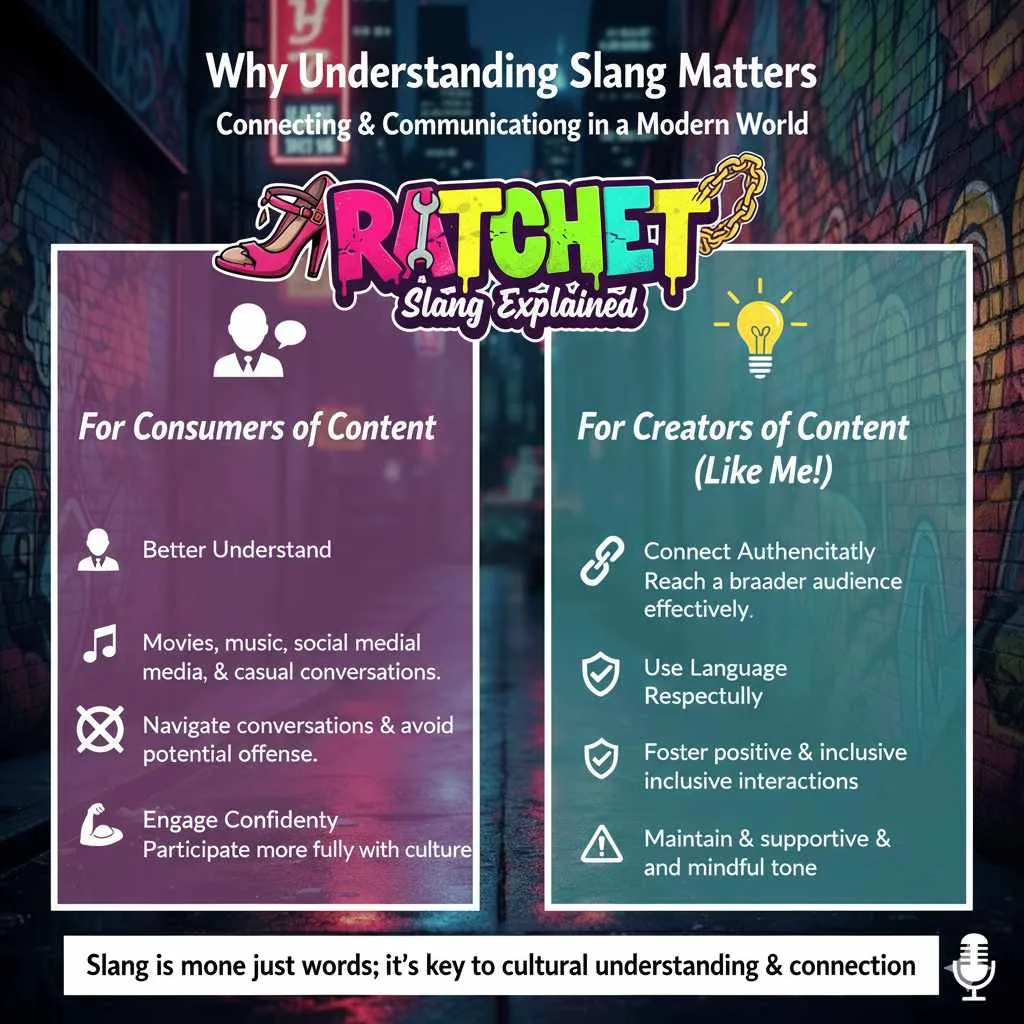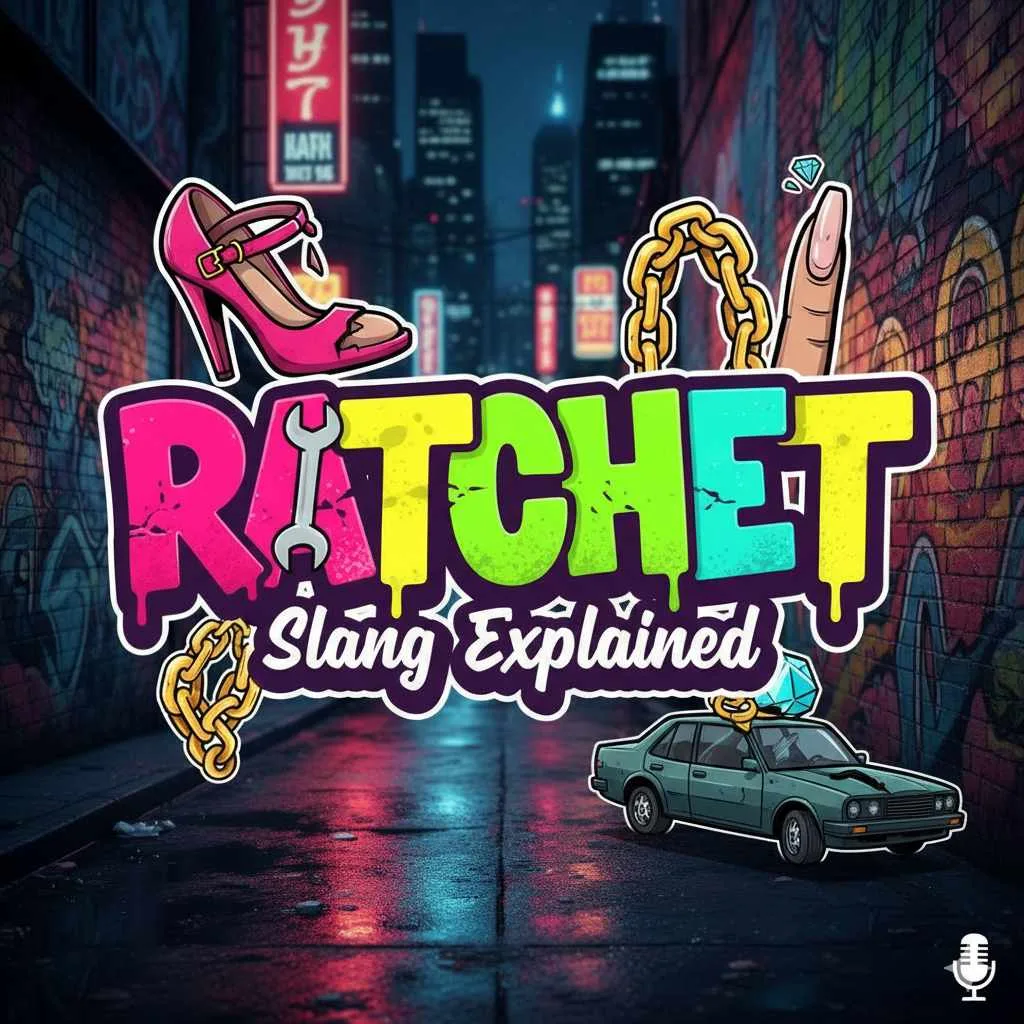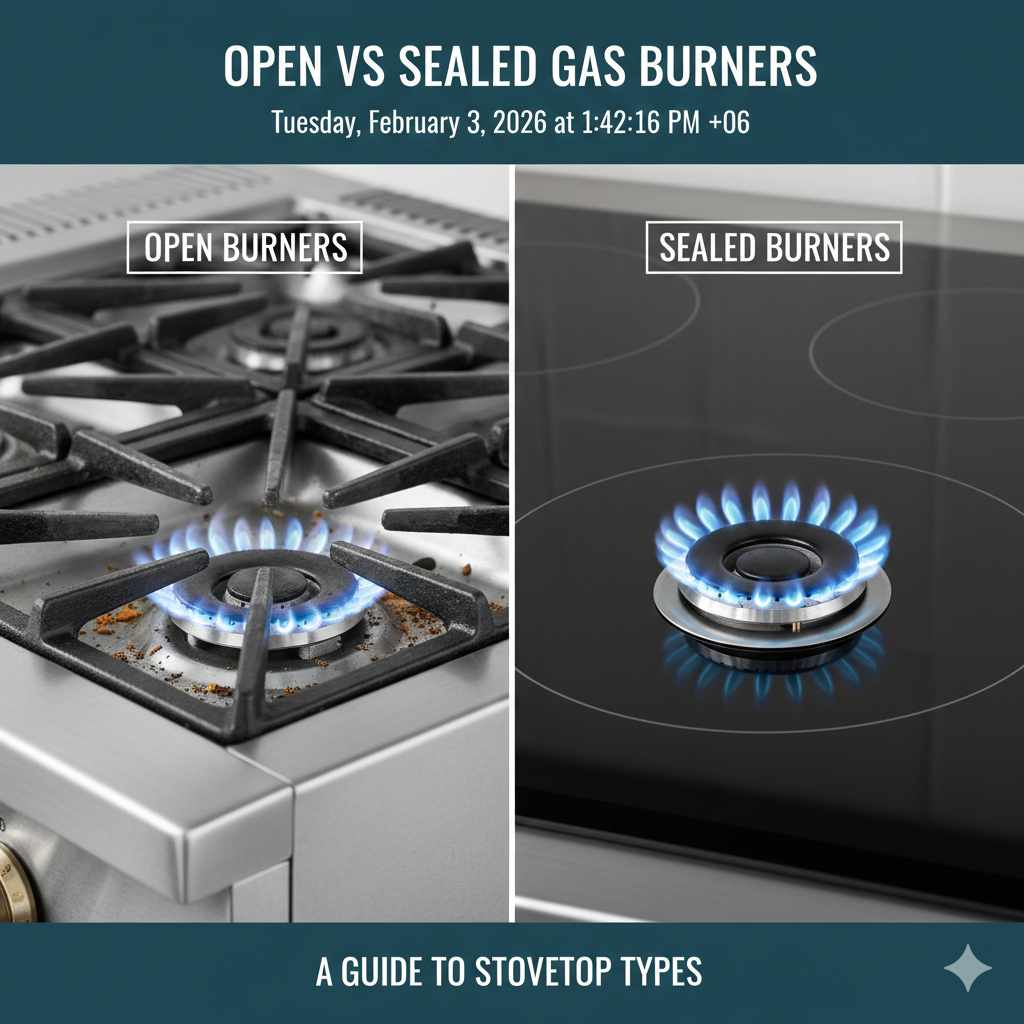In slang, “ratchet” describes someone or something perceived as unrefined, vulgar, or low-class. It’s often used to call out behavior or style that’s considered tacky, loud, or lacking in sophistication.
Navigating slang can feel like deciphering a secret code! If you’ve heard the word “ratchet” and felt a little lost, you’re not alone. It pops up in conversations and online comments, but its meaning isn’t always immediately clear. This word can sometimes feel a bit harsh, and understanding it can help you better grasp what people are trying to express. Don’t worry, though! We’re going to break down exactly what “ratchet” means in slang terms, along with some examples and nuances. Ready to unlock this piece of modern lingo? Let’s dive in and make it simple!
Understanding the Term: “Ratchet” in Slang
At its core, “ratchet” is a slang term used to describe a person, behavior, or situation that is considered unattractive, vulgar, unrefined, or low-class. Think of it as a way to label something or someone that doesn’t meet societal expectations of sophistication or good taste. It’s often associated with a lack of class, poor manners, or a generally unkempt appearance. Because it can be a judgmental term, it’s important to use it mindfully and understand its potential impact.
The origins of the word are a bit murky, but it gained significant traction in popular culture around the early 2010s, particularly within hip-hop music and urban communities. It’s often used in a derogatory way, similar to terms like “ghetto,” “trashy,” or “tacky,” but with its own distinct flavor.

What “Ratchet” is Not
It’s also helpful to understand what “ratchet” typically isn’t.
- Not a technical term: It has no connection to the mechanical tool called a ratchet, despite the shared word.
- Not necessarily about poverty: While sometimes linked to socioeconomic status, a person isn’t “ratchet” simply because they are not wealthy. It’s more about perceived behavior and presentation.
- Not always universally understood: Slang evolves, and interpretations can vary greatly depending on age, region, and social circles.
Common Ways “Ratchet” is Used
“Ratchet” can be applied in various contexts to describe different aspects of a person or situation. Here are some of the most common ways it’s thrown around:
Describing Behavior
This is perhaps the most frequent usage. “Ratchet” behavior often refers to actions that are seen as loud, aggressive, overly dramatic, or lacking in decorum.
- Having a public, shouting argument.
- Engaging in overly dramatic displays of emotion.
- Using excessive profanity in inappropriate settings (though profanity itself doesn’t automatically make something ratchet).
- Acting in a manner that is considered disrespectful or uncivil.
Describing Appearance
It can also be used to comment on someone’s style, clothing, or grooming, suggesting it’s unkempt, gaudy, or unfashionable.
- Messy, unstyled hair.
- Ill-fitting or overly revealing clothing.
- Excessive or poorly applied makeup.
- Having a generally unkempt or unpolished look.
Describing Situations
Sometimes, the term can extend to describe an environment or a scenario that is chaotic, unpleasant, or rundown.
- A party that has gotten out of control.
- A place that is messy or poorly maintained.
- A situation that has devolved into disorder.
Nuances and Context Are Key
It is crucial to understand that “ratchet” is a loaded term. Its meaning is heavily influenced by who is using it, who it’s being used about, and the specific social context.
Potential for Judgment
The term often carries a significant judgmental tone. It can be used to look down on individuals, particularly those from marginalized communities, and reinforce negative stereotypes. Using it casually can perpetuate harmful ideas about class and respectability. As a trusted advisor focusing on making homes feel welcoming and beautiful, I encourage you to consider the impact of your words and whether a term like this is truly necessary or constructive.
Gendered Usage
Historically, the term has been applied more frequently to women, often to police their behavior or appearance. This usage can be particularly problematic and contributes to double standards.
Evolution of the Term
Like all slang, “ratchet” can evolve. While its core meaning often remains negative, some brave souls might try to reclaim or subvert the term, using it ironically or playfully among close friends. However, for general understanding and to avoid causing offense, sticking to the more common, albeit critical, definition is safer.
Examples in Action
Let’s look at a few hypothetical scenarios to illustrate how “ratchet” might be used:
- Scenario 1 (Behavior): “Did you see how she was screaming at the cashier? So ratchet!” (Implying the behavior was loud, inappropriate, and lacked composure.)
- Scenario 2 (Appearance): “He showed up to the formal event in a stained t-shirt and flip-flops. Talk about ratchet.” (Implying the attire was unkempt and unsuitable for the occasion.)
- Scenario 3 (Situation): “After the party ended, the house was a disaster. It was completely ratchet.” (Implying the aftermath was messy and chaotic.)
- Scenario 4 (Object/Place): “That old, run-down car with the broken windows just sits there. It looks pretty ratchet.” (Implying the object is unappealing and neglected.)
How to Use (or Avoid) the Word
Given its potential for negativity and misinterpretation, many people choose to avoid using “ratchet” altogether. However, if you encounter it or feel the need to understand it in context, here are some tips:
When You Hear “Ratchet”:
- Consider the speaker: Is the person using it playfully or critically?
- Look at the context: What specific behavior, appearance, or situation is being described?
- Inquire if unsure: If you know the speaker well and feel comfortable, a simple “What do you mean by that?” can clarify things.
When You Might Think of Using “Ratchet”:
- Pause and reflect: Is there a kinder, more specific way to describe what you’re observing? Instead of “ratchet behavior,” could you say “disruptive,” “disrespectful,” or “uncontrolled”?
- Consider your audience: Will the person you’re speaking to understand the term? Will they take offense?
- Opt for clarity: If you want to describe something as unkempt, you could say “messy,” “untidy,” or “neglected.” If you want to describe something as lacking class, you might use “unsophisticated” or “unrefined.”
- Prioritize kindness: In your role as a home decorator, the goal is to build confidence and create welcoming spaces. Focusing on positive descriptions and gentle feedback is always more productive than resorting to potentially hurtful slang.
Related Slang Terms
Understanding “ratchet” can also help you make sense of other similar slang terms. Keep in mind that these can also be loaded and context-dependent.
| Slang Term | Potential Meaning | Similarities to “Ratchet” |
|---|---|---|
| Ghetto | Often used to describe something perceived as low-class, unrefined, or associated with urban poverty, sometimes unfairly. | Shares the implication of lack of class and refinement. Can also carry negative stereotypes. |
| Trashy | Indicates something is gaudy, low-quality, and in bad taste. | Similar to “ratchet” in implying something is unappealing due to poor taste or quality. |
| Tacky | Describes something that is in poor taste, lacking style, or conspicuously unfashionable. | Overlaps with “ratchet” in describing a lack of aesthetic appeal or sophistication. |
| Boujee/Bougie | A slang term derived from “bourgeoisie,” often used to describe someone who aspires to or exhibits perceived middle- or upper-class tastes and behaviors, sometimes with a hint of pretentiousness or irony. | Offers a contrast. While “ratchet” is about perceived low-class behavior, “boujee” is about perceived high-class affectations, though both can be used critically. The Merriam-Webster dictionary notes its colloquial usage. |
The Origin and Cultural Impact
The word “ratchet” as slang is thought to have roots in the African American Vernacular English (AAVE). Its rise in popularity is often attributed to its widespread use in popular culture. For instance, the 2014 film “Ride Along” featured a scene where the term was a central point of discussion, bringing it to a broader audience [IMDb Ride Along Quotes].
The popular song “Ratchet” by YFN Lucci also played a role in cementing the term in common usage. Such cultural touchstones can significantly influence how slang terms spread and are understood. However, it’s important to note that slang terms originating from specific cultural groups can sometimes be appropriated and used out of context by others, potentially diluting their original meaning or using them in ways that are offensive.
Why Understanding Slang Matters
As someone who loves helping you make your home beautiful and comfortable, I believe understanding language, including slang, is key to effective communication and connection.
For Consumers of Content
When you encounter terms like “ratchet,” knowing their meaning helps you to:
- Better understand movies, music, social media, and casual conversations.
- Avoid misunderstandings and potential offense.
- Engage more confidently with culture.
For Creators of Content (Like Me!)
For content creators, understanding slang is vital to:
- Connecting with a broader audience authentically.
- Using language appropriately and respectfully.
- Avoiding unintentional offense, especially when aiming for a supportive and inclusive tone.
My goal is always to demystify design and make everyone feel empowered to create a home they love. While slang isn’t directly about interior design, understanding nuanced language helps us all communicate better and foster more positive interactions.

FAQ About “Ratchet” Slang
Is “Ratchet” always a bad word?
Yes, “ratchet” as slang is almost always used negatively. It implies something is unrefined, vulgar, or low-class. While some might try to use it ironically, its primary connotation is critical or derogatory.
Can you use “ratchet” to describe objects?
Yes, you can. While often applied to people or their behavior, “ratchet” can also describe objects, places, or situations that are seen as unkempt, of poor quality, or generally unappealing due to a lack of refinement.
What is the difference between “ratchet” and “ghetto”?
Both terms are used to describe something perceived as low-class or unrefined. However, “ghetto” often carries stronger connotations related to urban poverty and lack of resources, sometimes unfairly stereotyping specific neighborhoods or communities. “Ratchet” tends to focus more specifically on behavior, appearance, or taste that is considered vulgar or lacking sophistication, regardless of socioeconomic status.
Is “Ratchet” offensive?
Yes, “ratchet” can be offensive. Because it’s often used to judge and demean people, particularly based on perceived class, behavior, or appearance, it can be hurtful and perpetuate negative stereotypes. It’s generally advisable to avoid using it.
Where did the slang term “ratchet” come from?
The slang origin of “ratchet” is believed to stem from African American Vernacular English (AAVE). It gained popularity in the early 2010s through music and media, eventually becoming more widely recognized.
Are there positive ways to describe things instead of “ratchet”?
Absolutely! If you’re trying to describe something that’s unkempt, you could use “messy,” “untidy,” or “disorganized.” If you mean something lacks sophistication, try “unrefined,” “unpolished,” or “simple.” Focusing on specific, neutral descriptions is always more helpful and kinder than using a loaded term like “ratchet.”
Conclusion
So, what does “ratchet” mean in slang? It’s a term used to describe someone, something, or a situation that is perceived as unrefined, vulgar, or lacking class and good taste. While it’s become a recognized part of modern vernacular, especially with its prevalence in pop culture, it’s crucial to remember that it’s often a judgmental and potentially offensive word.
As we aim to create beautiful, inviting spaces in our homes and build positive connections with others, focusing on clear, kind, and constructive language is always the best approach. Understanding terms like “ratchet” helps us navigate conversations and media more effectively, but using them requires caution. By choosing our words thoughtfully, we can ensure our interactions are respectful and empowering, just like we strive to make our homes feel!







